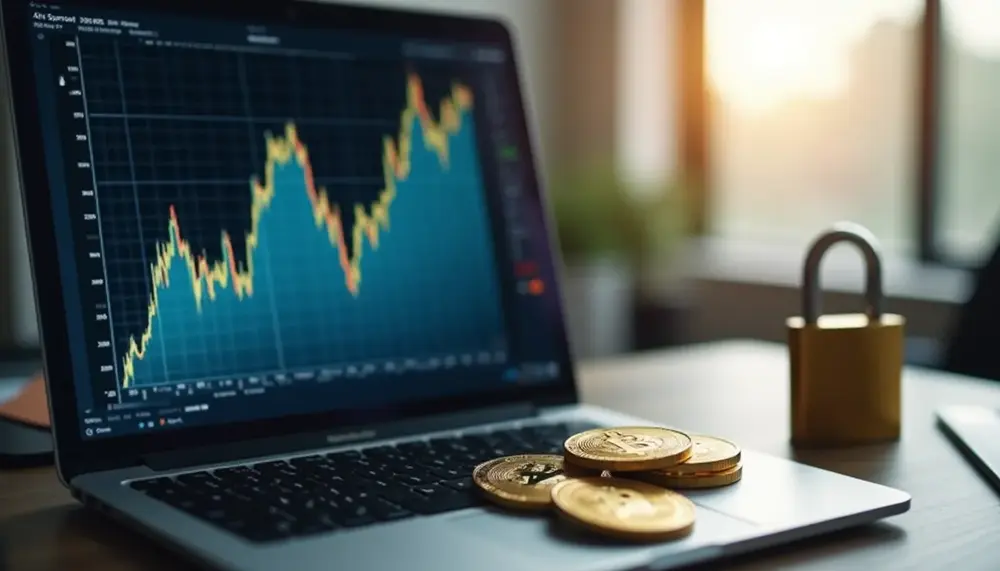Table of Contents:
Bitcoin Purchase: Expert Warns of Common Fraud Scheme
According to the Berliner Morgenpost, Bitcoin has recently reached new all-time highs, with the price exceeding 120,000 US dollars. Despite this, Sandra Klug from the Verbraucherzentrale Hamburg cautions against excessive expectations. She describes Bitcoin as primarily speculative and unsuitable for retirement planning due to its high volatility and lack of guarantees for future profits or even continued existence.
Klug explains that many victims of Bitcoin fraud report transferring money to providers for crypto investments after being contacted by supposed advisors who promise high returns. These advisors often become unreachable after receiving the funds, and the alleged balances are never paid out. Klug recommends that risk-averse investors educate themselves about blockchain and decentralized currencies to reduce the risk of falling for scams.
The Best Mining Providers at a Glance
» Infinity HashFrom our perspective, currently the best mining provider on the market. With the community concept, you participate in a mining pool completely managed by professionals. A portion of the earnings are used for expansion and maintenance. We've never seen this solved as cleanly anywhere else.
» Hashing24A well-known and established cloud hosting company. With a good entry point and in a good market phase, a good ROI can also be generated with some patience. Unfortunately, we see the durations as a major drawback.
"Kryptowährungen sind definitiv kein Altersvorsorgeprodukt. Der Kurs kann sehr stark schwanken. Es gibt keine Garantie, dass diese Währungen in Zukunft Gewinn abwerfen oder überhaupt noch existieren." – Sandra Klug, Verbraucherzentrale Hamburg
- Bitcoin reached over 120,000 US dollars.
- Klug warns: Bitcoin is speculation, not suitable for retirement.
- Common scam: Promised high returns, advisors disappear after receiving money.
- Klug recommends ETF savings plans and a liquidity buffer for retirement planning.
- Comprehensive consultation at Verbraucherzentrale Hamburg costs 180 euros for 1.5 hours.
Summary: The current Bitcoin hype is accompanied by significant risks and fraud schemes. Experts recommend traditional investment products for retirement and warn against using essential funds for speculative crypto investments. (Source: Berliner Morgenpost)
Spar Switzerland Accepts Bitcoin: Over 100 Branches Go Crypto
The NZZ reports that more than 100 Spar Switzerland stores now accept Bitcoin and stablecoins as payment. Customers can pay for everyday items by scanning a QR code at the checkout with their crypto wallet. The process is similar to a Twint transaction and is already being used daily, even though Spar has not yet actively promoted the new payment method.
Spar benefits from significantly lower transaction fees—about two-thirds less than Twint or card payments. DFX, the Zug-based company providing the technical solution, charges Spar a 0.2 percent fee per transaction. For customers, transactions are free when using the Frankencoin, a stablecoin pegged 1:1 to the Swiss franc. Payments with other cryptocurrencies such as Bitcoin, Ether, Solana, USDC, and USDT are also possible, with DFX converting them to francs in the background.
| Payment Method | Transaction Fee (for Spar) |
|---|---|
| Twint/Cards | Standard (2/3 higher than crypto) |
| Crypto (via DFX) | 0.2% |
| Frankencoin (Stablecoin) | 0% (for customers) |
- Over 100 Spar branches accept crypto payments.
- Transaction fees for Spar are reduced by about two-thirds compared to traditional methods.
- DFX provides the technical infrastructure and charges 0.2% per transaction.
- Payments are possible with Bitcoin, Ether, Solana, USDC, USDT, and Frankencoin.
- Frankencoin is pegged 1:1 to the Swiss franc and is created by depositing collateral such as Bitcoin or Ether.
Summary: Spar Switzerland is pioneering crypto payments in retail, offering customers and the company significant cost savings and a seamless payment experience. The move could pressure other retailers to follow suit. (Source: NZZ)
House or Bitcoin: Which Is the Better Investment?
According to FinanzNachrichten.de, 80% of Germans wish to own a home, but 53% still rent. Private investors in Germany invest between 1 and 1.5 billion euros annually in real estate. The average purchase price for a single-family home is between 450,000 and 500,000 euros, with buyers typically providing 20–25% equity (100,000–125,000 euros).
Historically, real estate prices in Germany increase by 3–5% per year, but after deducting ancillary costs, the net increase is estimated at 1.5–2.5%. Over ten years, this results in a value increase of 35–60%, bringing the house's value to 675,000–800,000 euros. With leverage, the return on equity is 175–300% (275,000–400,000 euros), or 150–220% after costs. If rented, the net rental yield averages 2% after costs, increasing the total return to 170–245% over ten years.
In comparison, the average nominal Bitcoin price target for 2025 is 179,000 euros, for 2030 is 545,000 euros, and for 2035 is 675,000 euros. This corresponds to a projected return of 445% in five years and 575% in ten years. After accounting for inflation (2–3% per year, resulting in a 25–30% loss of purchasing power), the real return is about 375–400%. Thus, real estate offers a realistic return of 150–220% (or 170–245% if rented) over ten years, while Bitcoin could offer 370–400% after inflation and without ongoing costs.
| Investment | 10-Year Return (after costs/inflation) |
|---|---|
| Real Estate (owner-occupied) | 150–220% |
| Real Estate (rented) | 170–245% |
| Bitcoin | 370–400% |
- Real estate offers more security but lower returns compared to Bitcoin.
- Bitcoin's sustainability is questioned by some experts due to decreasing block rewards.
- New scaling solutions like Bitcoin Hyper could further increase Bitcoin's potential returns.
- Bitcoin Hyper's presale has raised 11.85 million USD, with the HYPER coin currently priced at 0.012795 USD.
Summary: While real estate provides stability and moderate returns, Bitcoin offers significantly higher potential returns, albeit with greater risk and volatility. New technologies could further enhance Bitcoin's utility and value. (Source: FinanzNachrichten.de)
Why Isn't Bitcoin Rising?
As reported by stuttgarter-nachrichten.de, despite hopes for a Federal Reserve interest rate cut following Jerome Powell's speech, the Bitcoin price did not rise as expected. Instead, Bitcoin experienced a brief surge followed by a sudden "flash crash." The cause was the sale of 24,000 Bitcoins, worth over 2.7 billion US dollars, by an unknown large investor (whale) over the weekend.
This massive sale flooded the market with more supply than demand, causing the price to drop rapidly from around 114,000 to 110,000 US dollars within minutes. The abrupt price drop also triggered the liquidation of trading positions worth several hundred million US dollars, as many traders' risk limits were breached.
| Event | Impact |
|---|---|
| Sale of 24,000 BTC | Market flooded, price drop from 114,000 to 110,000 USD |
| Liquidations | Hundreds of millions of USD in trading positions liquidated |
- Bitcoin price is highly sensitive to large-scale sales by major investors.
- Sudden market movements can trigger widespread liquidations among leveraged traders.
Summary: The Bitcoin market remains highly volatile and susceptible to large transactions by major holders, which can cause rapid and significant price swings. (Source: stuttgarter-nachrichten.de)
Social Engineering: Crypto Investor Loses Bitcoin Worth 90 Million USD
Golem reports a case where a crypto investor lost Bitcoin valued at 90 million US dollars due to social engineering. The article highlights the risks associated with holding large amounts of cryptocurrency and the sophisticated methods used by attackers to gain access to digital assets.
- Investor lost Bitcoin worth 90 million USD.
- Attackers used social engineering techniques to gain access.
- The case underscores the importance of robust security measures for crypto holders.
Summary: Even experienced investors are vulnerable to social engineering attacks, emphasizing the need for heightened security and vigilance in the crypto space. (Source: Golem)
Sources:
- Bitcoin als Geldanlage für Kinder: Bitcoin statt Sparbuch: Warum Eltern ihren Kindern heute Satoshis schenken
- Bitcoin kaufen? Expertin warnt vor gängiger Betrugsmasche
- Bei Spar Schweiz mit Bitcoin zahlen: Über 100 Filialen setzen auf Krypto-Währungen
- Haus oder Bitcoin kaufen - Was lohnt sich jetzt mehr?
- Warum steigt der Bitcoin nicht?
- Social Engineering: Krypto-Anleger verliert Bitcoin im Wert von 90 Millionen USD




















